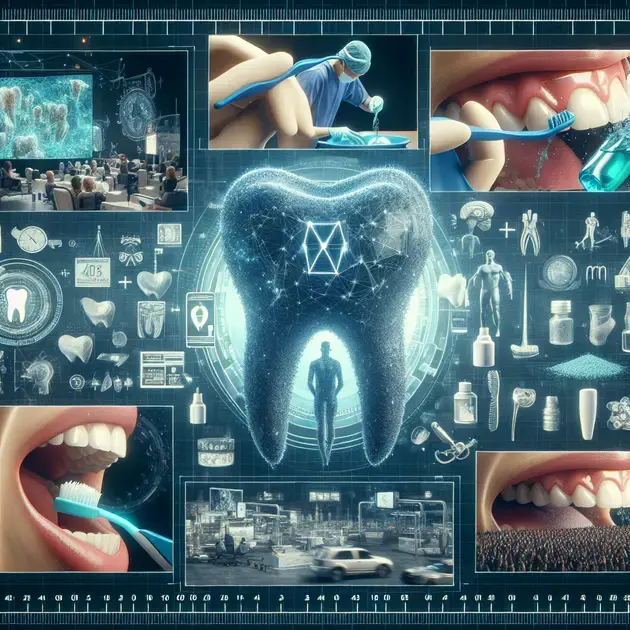Dealing with bad breath, also known as halitosis, can be a challenge for many people. However, with the right approach and proper oral hygiene, it is possible to combat this issue effectively. Bad breath can be caused by various factors, including poor dental hygiene, certain foods, and underlying health conditions.
Fortunately, there are several ways to tackle bad breath and improve your oral health. From establishing a consistent brushing and flossing routine to staying hydrated and visiting your dentist regularly, taking proactive steps can help you conquer bad breath and boost your confidence.

Understanding Bad Breath Causes and Solutions
Bad breath, also known as halitosis, can be embarrassing and bothersome for many individuals. Understanding the root causes of bad breath is crucial in effectively addressing and eliminating this issue. One common cause of bad breath is poor oral hygiene. Failure to brush and floss regularly can lead to the buildup of bacteria in the mouth, resulting in unpleasant odors.
A step-by-step approach to improving bad breath due to poor oral hygiene includes using a good quality toothbrush and toothpaste to brush your teeth at least twice a day. Additionally, incorporating a tongue scraper in your oral care routine can help remove bacteria build-up on the tongue, contributing to fresher breath.
Another common cause of bad breath is dry mouth, also known as xerostomia. Saliva plays a crucial role in cleansing the mouth and neutralizing acids produced by bacteria. To combat dry mouth and improve saliva production, consider using a mouthwash specifically designed to combat dry mouth, such as Biotene Mouthwash.
It’s important to note that certain foods, such as onions and garlic, can also contribute to bad breath. To combat the odors caused by these foods, try incorporating parsley or mint leaves into your meals, as they are natural breath fresheners.
In addition to addressing the root causes of bad breath, incorporating a daily routine of thorough oral hygiene practices and making dietary adjustments can significantly improve the overall freshness of your breath.
The Importance of Consistent Oral Hygiene
Maintaining consistent oral hygiene practices is essential for achieving optimal dental health and preventing issues such as bad breath. Brushing and flossing regularly are fundamental steps in maintaining clean teeth and gums, as they help remove plaque and food particles that can lead to bacterial growth and odors.
To establish a successful oral hygiene routine, start by brushing your teeth for at least two minutes each time, using a fluoridated toothpaste like Crest Pro-Health. Make sure to angle the toothbrush towards the gum line to effectively remove plaque buildup.
Incorporating mouthwash into your oral care regimen can further enhance the cleanliness of your mouth by reaching areas that may be difficult to brush or floss. Look for alcohol-free mouthwashes like Listerine Zero, as alcohol can dry out the mouth and potentially contribute to bad breath.
Don’t forget about the importance of regular dental check-ups and cleanings. Visiting your dentist every six months for a professional cleaning and examination can help detect and address any oral health issues early on, ensuring a healthy and fresh smile.
Consistency is key when it comes to oral hygiene. By implementing a regular routine of brushing, flossing, using mouthwash, and visiting your dentist, you can maintain optimal oral health and keep bad breath at bay.
Effective Strategies for Combating Halitosis
Halitosis, or chronic bad breath, can be a persistent and frustrating issue for many individuals. However, there are effective strategies that can help combat halitosis and promote fresher breath. One essential strategy is to stay hydrated throughout the day by drinking plenty of water.
To combat bad breath caused by dry mouth, consider using a hydrating mouth spray or lozenges such as TheraBreath Dry Mouth Lozenges. These products can help stimulate saliva production and alleviate dryness in the mouth, reducing the likelihood of bacterial growth and odors.
Incorporating probiotics into your diet or using probiotic supplements can also be beneficial for combating halitosis. Probiotics help balance the oral microbiome, reducing the presence of odor-causing bacteria and promoting a healthier mouth environment.
Regularly cleaning and replacing oral appliances such as dentures, retainers, or mouth guards is crucial in preventing bad breath. Bacteria can accumulate on these devices, leading to unpleasant odors. Use a denture cleaner like Polident to effectively clean and disinfect removable oral appliances.
Lastly, practicing good overall oral hygiene habits, including brushing your teeth, flossing, and scraping your tongue, is pivotal in combating halitosis. By incorporating these effective strategies into your daily routine, you can tackle halitosis at its source and enjoy long-lasting fresh breath.

Understanding the Science Behind Oral Health
When it comes to oral health, understanding the science behind it is crucial for maintaining a healthy smile. The mouth is home to millions of bacteria, some of which are beneficial, while others can be harmful and lead to dental issues. The process of tooth decay, for example, is caused by the interaction between these bacteria and the sugars from the foods we eat.
Additionally, the health of our gums plays a significant role in our overall oral health. Gum disease, if left untreated, can lead to more severe problems such as tooth loss and even impact our overall health. Understanding the importance of regular dental check-ups and cleanings can help prevent these issues from occurring.
Furthermore, advancements in dental technology have allowed for a better understanding of oral health. Techniques such as digital radiography and intraoral cameras enable dentists to diagnose and treat dental problems more effectively. By staying informed about these advancements, individuals can make better decisions for their oral health.
Overall, understanding the science behind oral health involves knowledge of how bacteria interact in the mouth, the importance of gum health, and the impact of technological advancements on dental care.
Improving Your Smile with Advanced Dental Techniques
Improving your smile goes beyond just aesthetics; it also contributes to your overall confidence and well-being. Advanced dental techniques offer innovative solutions to enhance the appearance of your teeth and correct any dental issues you may have. From teeth whitening to orthodontic treatments, there are various options available to help you achieve the smile of your dreams.
One advanced dental technique that has gained popularity is the use of dental veneers. These thin shells are placed over the front surface of the teeth to improve their appearance, shape, and color. Veneers can address issues such as discoloration, gaps between teeth, and minor alignment problems.
In addition to cosmetic treatments, advanced dental techniques also include restorative procedures such as dental implants and crowns. These options can help restore the function of your teeth and improve your overall oral health. By consulting with a skilled dentist, you can explore the advanced techniques that are best suited for your individual needs.
Ultimately, improving your smile with advanced dental techniques involves a combination of cosmetic and restorative procedures tailored to enhance the aesthetics and functionality of your teeth.
Empower Yourself with Knowledge on Oral Care Practices
Empowering yourself with knowledge on oral care practices is essential for maintaining a healthy and beautiful smile. Understanding the proper techniques for brushing and flossing can significantly impact your oral health by preventing plaque buildup and reducing the risk of cavities and gum disease. Regular dental visits also play a crucial role in ensuring that any potential issues are addressed promptly.
Moreover, being aware of the impact of diet and lifestyle choices on oral health can help you make informed decisions to protect your teeth and gums. Limiting sugary foods and beverages, quitting smoking, and incorporating a balanced diet rich in vitamins and minerals are all key factors in promoting good oral health.
Furthermore, staying informed about the latest trends and advancements in oral care can help you stay ahead of the curve when it comes to maintaining your smile. From new toothpaste formulations to innovative dental tools, knowledge is power when it comes to oral care practices.
In conclusion, empowering yourself with knowledge on oral care practices involves adopting proper oral hygiene habits, making healthy lifestyle choices, and staying informed about the latest developments in dental care.
Conclusion
Understanding the science behind oral health is paramount for a radiant smile and overall well-being. The intricate balance of beneficial and harmful bacteria in the mouth can significantly impact dental health, with tooth decay being a common consequence of their interaction with sugars from our diet. Furthermore, one cannot overlook the crucial role of gum health in maintaining oral well-being; neglecting gum disease can lead to severe complications such as tooth loss. Regular dental check-ups and cleanings are vital in preventing these issues.
Advanced dental techniques offer a spectrum of solutions to enhance your smile beyond aesthetics. From teeth whitening to orthodontic treatments, there exists a myriad of options to achieve the smile you desire. Popular procedures like dental veneers can address various issues like discoloration and minor alignment problems, providing a significant boost to your confidence and oral health.
Empowering yourself with knowledge on oral care practices is pivotal in preserving a healthy and beautiful smile. Mastering the correct techniques for brushing and flossing can thwart plaque buildup, reducing the risk of cavities and gum disease. Dietary choices also play a crucial role; by limiting sugary foods, quitting smoking, and embracing a nutrient-rich diet, you can promote optimal oral health.
Staying informed about the latest trends in oral care equips you with the tools to maintain your smile effectively. Whether it’s embracing new toothpaste formulations or leveraging innovative dental tools, knowledge is key. In conclusion, the path to a healthy smile entails understanding oral health science, exploring advanced dental techniques, and empowering yourself with informed oral care practices. Embrace these pillars, and your smile will radiate with health and confidence!



